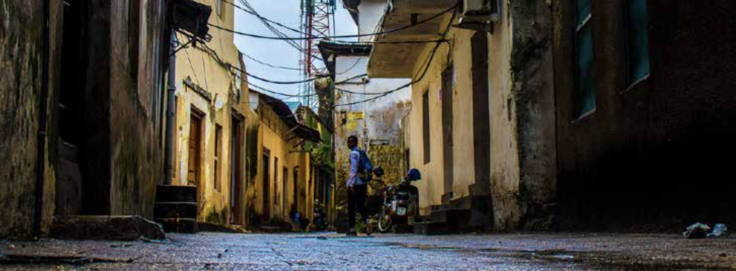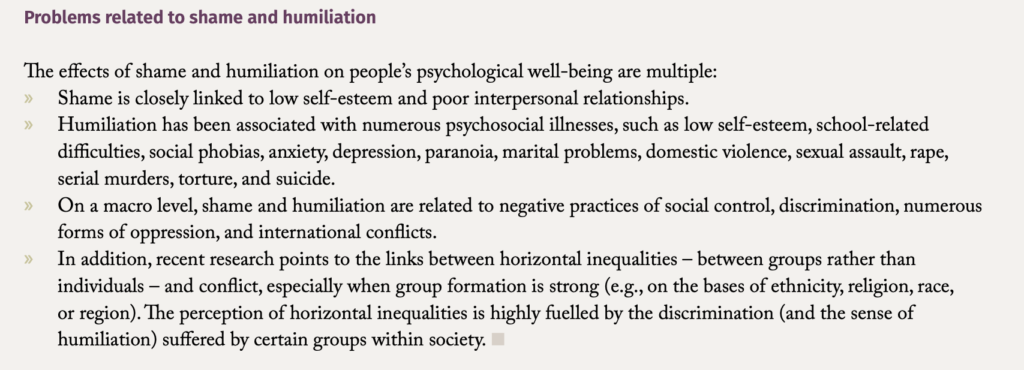
Search
Shame, humiliation, and poverty

What do a survivor of the Bangladeshi war of independence, a leprosy sufferer, and a Colombian demobilised FARC member have in common? The answer is that stigma and discrimination –which are related to the emotional states of shame and humiliation – have played a central role in the poverty of these people, as it shows in the three stories published in the Spanish newspaper El País that we will see below.
Rajavala Devi is one of the approximately 200,000 women who suffered sexual violence by Pakistani soldiers during the Bangladeshi war of independence. As a result, Rajavala has not only had to bear the physical and psychological consequences of those attacks all her life, but has also faced being ostracised from society and suffered a social stigma that prevented her from fully rebuilding her life after the attacks and the deaths of her husband and son.
Women like Rajavala have been treated as ’infected‘ and as ’prostitutes‘, accused of being willing participants in their assaults. The abandonment and stigma generated by this has impacted Rajavala’s life in many dimensions, and, like most women who have suffered the same fate, she has been condemned to live a severely impoverished life.
Bekele is one of the residents in the village of Gambo, in the Oromia region of Ethiopia. This village grew up around a leprosarium run by a religious order. Bekele arrived there at the age of 16, when his parents recognised the first symptoms of leprosy in his body, and he never again left the village – not even when they managed to cure him. He is one of approximately 5,000 new cases of leprosy diagnosed each year in Ethiopia, and one of more than 30,000 people living with permanent disabilities from the disease.
Feeling shame and/or humiliation for being poor causes instrumental harm and affects the other dimensions of people’s lives.
Bekele still lives in the village. There, he says, ’I am like the others; here, I am not different‘. Bekele says that he leads a normal life, but that was not always the case. There was a time when ‘I was stigmatised and abandoned by my loved ones just because I was sick… [my] family, my pals, all the village rejected me’, he says.
In Bogotá, Colombia, the vast majority of demobilised FARC guerrilla fighters, who are in the process of reintegration following a 50-year war, live in the areas with the greatest inequality and the highest percentage of victims of the conflict. Trying to reintegrate them into society is one of the biggest challenges of that country’s post-conflict reconstruction.
For the Agency for Reincorporation and Normalisation (ARN), the greatest obstacle to overcome is stigmatisation, because there remains a widespread prejudice that the demobilised person is violent. This means that the majority of the population would not like to have a demobilised guerrilla as a neighbour or workmate, and this affects their chances of finding work or migrating to areas with better housing conditions.
What these three cases show is the close relationship between aspects of shame (stigma) and humiliation (discrimination) and poverty.
This is nothing new. In the Voices of the Poor study, the largest qualitative study carried out worldwide, people living in poverty are asked how they would define ‘poverty’. Their answers leave no room for doubt: ‘poverty is not having money, not having health, not having decent housing, not being able to study… but it also is suffering humiliation by others for being poor, being undermined in our dignity by our poverty, not being able to participate in what is customary in society because of our condition’.
Associating shame and humiliation with poverty is relevant for two reasons. First, there is the intrinsic harm caused by shame and humiliation. In poor people’s stories, we see how hurtful both emotions can be and the importance of personal dignity.
Second, feeling shame and/or humiliation for being poor causes instrumental harm and affects the other dimensions of people’s lives. For example, they can prevent public policies designed to combat poverty from having positive results (a person decides not to visit a health centre because they know they will experience discrimination); shame and humiliation can stop people from taking actions to improve their lives (like attending an educational centre, applying for a loan, or seeking employment). All of this can also result in poverty traps that perpetuate the situation of people living in that condition.
Shame and humiliation are clearly a central aspect of the poverty experienced by Rajavala Devi and young Bekele, and play a determining role in the chances of those demobilised guerrillas returning to a peaceful life. And yet, shame and humiliation are rarely taken into account in poverty analyses. Moreover, data are certainly not collected at the international level to determine the true scale of the problem, and its relationship with other important variables of people’s well-being. Some may argue that these examples are not common and that could be the explanation for the absence of data. But these issues come up again and again in multiple everyday aspects of life: in care at health centres, in the education system, among women, among indigenous and Afro populations, in a variety of dimensions of life, and in the stigma suffered by HIV/AIDS patients, to name but a few.
Solving this data problem does not require huge financial resources or long periods of time. By including a few additional questions in household surveys, we would collect the information needed to identify the people subject to these scourges and could devise interventions to ameliorate their plight. For example, by investing in the training of hospital staff and by defining control mechanisms to diminish potential discrimination, we would significantly reduce people’s reluctance to attend a health centre for fear of discrimination.
The cost-benefit ratio of this type of intervention is low and could increase the efficiency of health policies. More importantly and impossible to quantify, it will help maintain people’s dignity.

This article was published in Dimensions 9
















